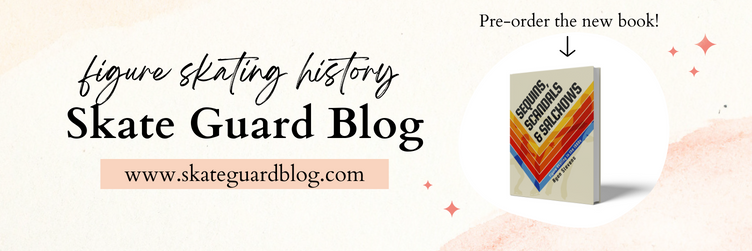I don't know about you, but I am a huge Barbara Ann Scott fan. For her time, her skating was just miles above what many of her competitors were doing and she had - throughout her life - such a sense of class, grace and humility. Today on the blog, we're going to take a look at some wonderful advice about competitive skating that Barbara Ann shared in her 1950 autobiography "Skate With Me". Surprisingly, over sixty five years later, much of it still holds up beautifully and what doesn't is delightfully charming. Pour yourself a nice cup of tea and learn a thing or two from this late, great Olympic Gold Medallist, World, European and North American Champion:
"Remember that the more technical fine points are not what they come to see. They want to be amused or startled."
"If you take a chance with old laces they are apt to break at the most inconvenient moment, just as your turn comes in a competition. Be sure not to leave your laces hanging. Tuck them in securely so that they can’t come loose. Don’t use ordinary hairpins. They are too apt to fly out. Be sure that you have your hair tethered down securely, for there is nothing Very appealing about a girl skating with her hair flopping all over her face. I used to wear a little bonnet which served the double purpose of keeping my hair back and my ears warm."
"You can’t do all of it alone. There must be someone, in whose knowledge you have faith, standing by to tell you what you are doing wrong because, at various points, we all go wrong."
"As the great day for which you have been training so hard approaches you will be more and more keyed up, an inevitable result of hard training and anxiety about competition, and so it will be more difficult for you to keep your mind on details that are of secondary importance to you, while at the same time you will tend to overemphasize the details that seem to you to be of primary importance. As you lose perspective - as it is only natural that you should do, for you are putting a great deal of yourself into the balance of one day and evening when you must perform in a certain way or feel that you have wasted all that has gone into preparation for that performance - you will find it harder to deal with others fairly. You will have to fight down impulses to be too demanding or too impatient and those are battles not worth fighting if, by using forethought, you can avoid them."
"Remember that all the others are apt to be keyed up, high-strung, and perhaps even overworried about themselves. People in this condition can be put off by a discouraging remark which will loom mountain-big in their minds; so be very, very careful about what you say and how you say it."
"When you are in the dressing room, I think, you should be friendly with those with whom you are to compete. You should encourage them and make it unmistakably clear that you wish them to have good luck just as you wish it for yourself. Doing that not only makes you feel better but you’ll find that the others will react to it and be nice to you."
"Watch your attitude toward judges, also, and never let the idea take root that they are prejudiced against you and are giving someone else the better breaks. They aren’t. They are there to help you by telling you accurately just how you stack up against the others. If you do something well they will give you credit for it. They are interested in the sport and so they are interested in you, for you are one of those who are developing the sport, carrying it on, introducing elements of skill that once were not known. So naturally they are your friends. Keep that in mind. It is a great comfort to you, while a cynical or complaining attitude is a tormenting burden."
"There are some people who may try to discourage you by making little remarks. Remember that a likely reason for their doing this is that they are afraid you are better than they are. You won’t meet many such people, but you do run into them occasionally and you should be aware of why they do this and not let their little remarks fester in your mind, for that can be very bad for you. just as you watch your diet you must guard your mind from drops of poisonous doubts, for the way you think has a mighty effect upon the way your body behaves at critical moments in competition. By your work and long hours of practice - and, yes, looking for signs that will make you believe that you are due to have good luck - you are creating a kind of structure of confidence and this structure must be kept solid and strong."
Skate Guard is a blog dedicated to preserving the rich, colourful and fascinating history of figure skating. Over ten years, the blog has featured over a thousand free articles covering all aspects of the sport's history, as well as four compelling in-depth features. To read the latest articles, follow the blog on Facebook, Twitter, Pinterest and YouTube. If you enjoy Skate Guard, please show your support for this archive by ordering a copy of the figure skating reference books "The Almanac of Canadian Figure Skating", "Technical Merit: A History of Figure Skating Jumps" and "A Bibliography of Figure Skating": https://skateguard1.blogspot.com/p/buy-book.html.


